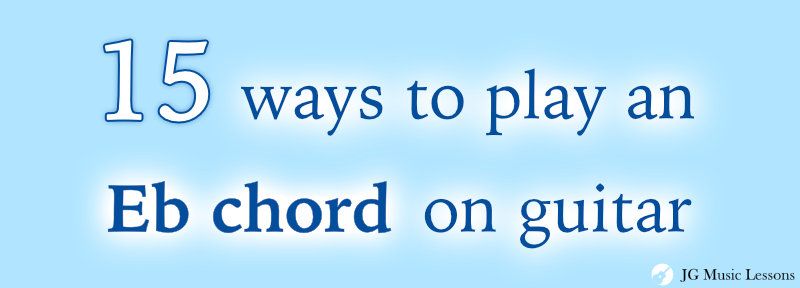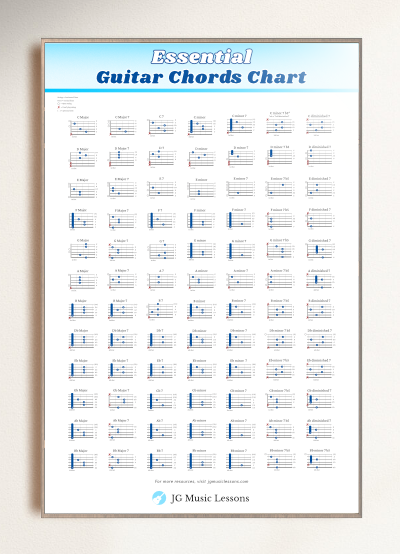The Eb chord is a less commonly known chord when first learning to play guitar. The lowercase ‘b’ represents a flat, meaning the note indicated is lowered by a half step.
If you look up how to play an Eb chord (E flat), this might come up as a barre chord on the 6th fret, starting on the 5th string. This can be a difficult chord for a beginner, but there are many different ways you can play this chord on the guitar.
This lesson covers 15 ways to play an Eb chord on guitar which you can start to incorporate into your playing. Let’s first get started by going over some basic chord theory.
Eb chord theory
Major triad chords are built upon the chord tones 1, 3, and 5. These chord tones can also be thought of as the scale degrees related to one Major scale.
For example, in an Eb Major scale, the notes Eb (1), G (3), and Bb (5) make up an Eb Major chord.
You can also think of the step formula for Major chords below.
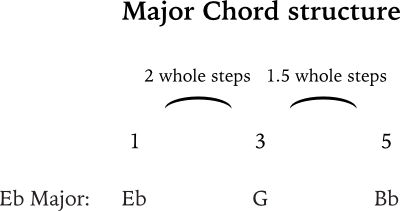
In contrast, minor triad chords contain the chord tones 1, b3, and 5. For example, an Eb minor chord would contain the chord tones Eb, Gb, and Bb. However, we will only be covering the different Major chord variations in this lesson.
Now that you know what notes belong to the chord structure let’s look at how to read the chord charts.
How to read the chord charts
For the charts below:
- The top horizontal line of the chord chart represents the high E string and the bottom horizontal line represents the low E string.
- The vertical lines separate each fret.
- The numbers in the blue dots tell you which fingers to use on the fretting hand.
- The letters on the right of the charts tell you what notes you are playing on each string.
- Circles on the left represent open strings.
- Red X means to avoid that string.
You can check this link for more on how to read guitar notation symbols.
Eb chord on the 5th string (without a barre)
For this first Eb chord shape, you have to make sure to not let the 1st string ring out. You can mute the 1st string letting the bottom part of your first finger lightly touch the string.
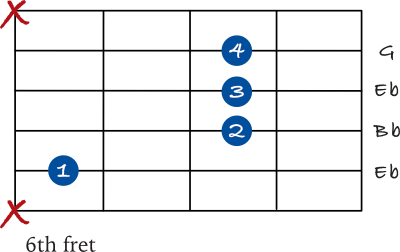
Eb barre chord on the 5th string
Now, we can add one more note to the previous shape. This is probably the most common chord shape that will show up when looking up an Eb chord. This shape comes from the open A Major chord except you have to rearrange your fingers as you barre the 6th fret with your 1st finger.
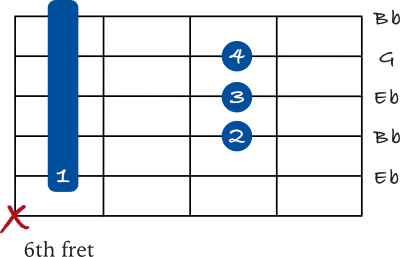
Eb chord 5th string variation
Here is another variation you can use for an Eb Major chord starting on the 5th string, 6th fret.
This shape uses a wider grip on the fretting hand which takes practice to get comfortable with. This shape comes from the open C Major chord except you have to rearrange your fingers when you add your pinky (4th finger).
It looks like this:
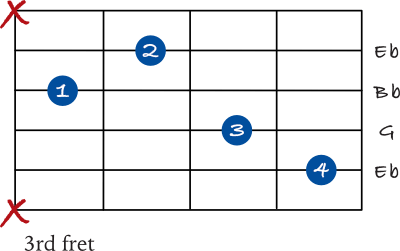
Eb chord 5th string variation with a mini barre
This is similar to the previous chord except you can use your first finger to barre the 1st string as well. It looks like this:
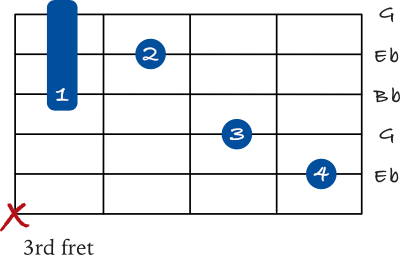
Eb chord triad
Here is another way you can play the Eb Major chord using a triad shape. This shape is similar to an open A Major chord except you slide all your fingers one fret lower. Or you can use a barre with your first finger to cover multiple strings like this:
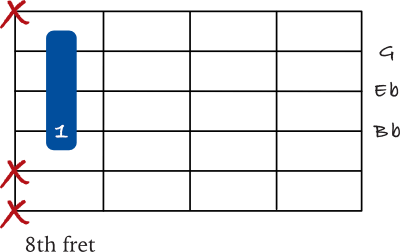
Eb chord 6th string variation
Based on the previous chord, you can also add notes on the 6th and 5th string to make this a full sounding chord like this:
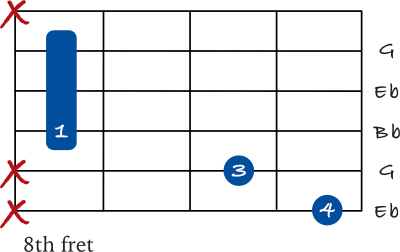
Eb chord on the 4th string
This shape comes from the open D Major chord except you have to rearrange your fingers as you add your 1st finger. This shape can feel uncomfortable when first learning it but you will get better at it as you keep reviewing it.
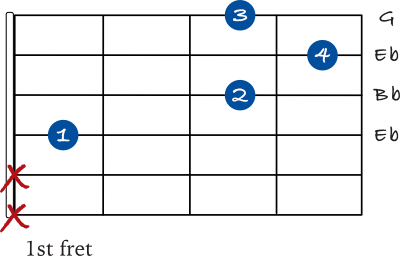
Eb chord simple triad
If your guitar is suitable to play past the 12th fret, here is an easy way you can play the Eb Major chord by using a simple triad shape. This is very similar to an open C Major chord shape but you move your ring and middle finger down one string and shift the root note to the 13th fret on the 4th string.
The shape looks like this:
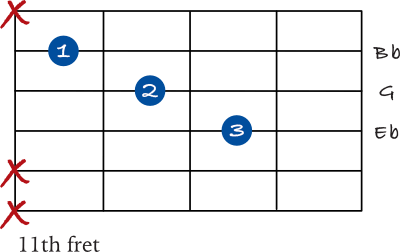
Eb chord triad 2nd inversion
2nd inversion means that the 5th degree of the chord is in the bass. Here, we add our pinky finger to the previous shape which makes the chord sound fuller. You can play it like this:
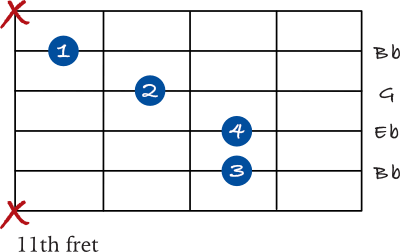
Eb chord mini barre
Another way to play this chord is to use a mini barre on the 1st and 2nd strings. The mini barre can be hard at first but it will get easier as you continue to practice it. The chord looks like this:
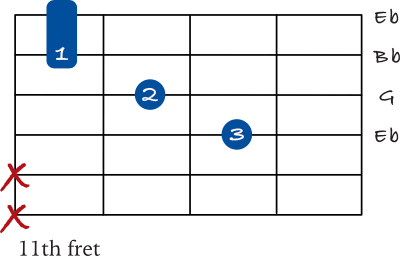
Eb chord 2nd inversion with mini barre
Also, adding your pinky to the previous shape makes the chord sound fuller like this:
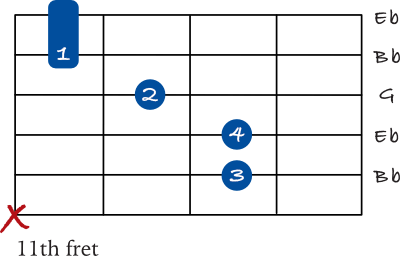
You can also check out this other lesson for more on how to play chord inversions on the guitar.
Eb barre chord on the 6th string
At this point, we’ve worked on different steps to take before getting to this chord because it requires more strength in your fretting hand.
This shape comes from the open E Major chord except you have to rearrange your fingers as you barre the 11th fret with your 1st finger like this:
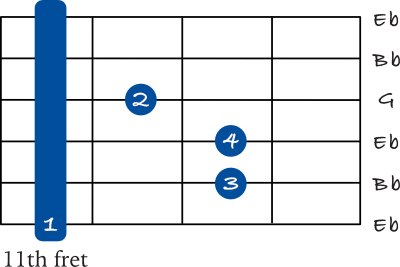
You may also want to check out 5 tips to get better at playing barre chords on guitar.
Eb chord spread shapes
The following chords are called spread shapes because of the wider space between some of the notes within the chord shape. Because these chord shapes skip a string, they are more suitable for a finger picking style of playing. You might also hear these chords in a more classical music context.
To go more in-depth, check out this lesson on how to play spread triad chords on the guitar.
Eb spread chord on the 6th string
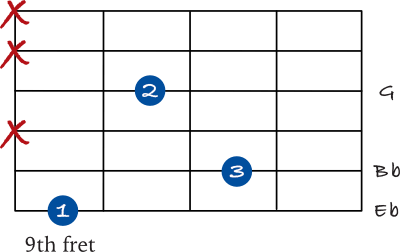
Eb spread chord on the 5th string
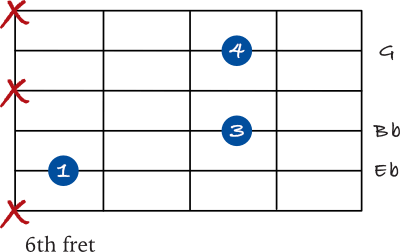
Eb spread chord on the 4th string
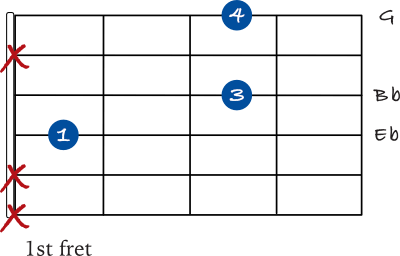
Wrapping up
Most of the Eb chords we covered here where in root position, meaning the root note is in the bass. However, you have even more variations if you use different chord inversions. This is when you play a chord with notes other than the root in the bass.
It’s good to know many possibilities of playing the same chord because you have more flexibility to move around the fretboard. Also, you can use different chord variations when you need a certain note at the top to help define a melody that you are playing over.
I hope this helped you understand how to play an Eb Major guitar chord or learn new ways of playing it. You can also try shifting these shapes to play other Major chords on the same string.
📘 Get the free guitar practice guide here!
Start Playing Better, Faster
with Pro Membership! ✨
Get the guidance, tools, and support that keep your progress on track:
🏁 Always know what to practice next. Access the full Guitar Learning Roadmap with lessons in sequence.
🎼 Play songs with confidence. Step-by-step lessons of popular, classical pieces and other styles.
📙 Save time and frustration. Clear PDFs and ebooks that save time so you can focus on playing.
🎟️ Get rewarded for consistency. 2 free downloads every month (a $240+ yearly value).
🎁 Keep costs low while you grow. 50% off all charts, tracks, and posters — up to 75% off bundles.
🚫 Stay focused. Ad-free environment keeps you in the zone.
💬 Get help when you need it. Direct member support to keep you on track.

